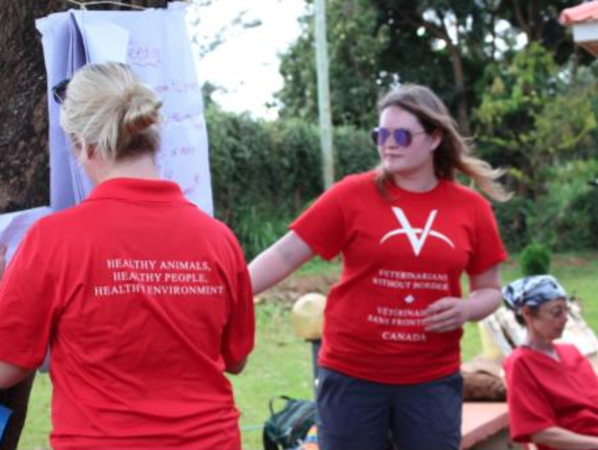VWB raises over $26,000 for animals and communities in need through Animals & Ales Pet Photo Contest
VWB wrapped up its fifth Animals & Ales Pet Photo Fundraiser Contest in partnership with six breweries.

At the production level, smallholder farmers dominate the dairy industry in Kenya; this means more households are involved in the dairy value chain in Kenya compared to Canadian dairy farming operations. Canadian farmers may have hundreds of dairy cattle in one herd compared to the average smallholder Kenyan farmer’s 1-3 cattle. Therefore, the Kenyan dairy industry contributes to the livelihoods of many farmers, many of whom lack formal economic opportunities and are subsistence farming, wholly relying on livestock for income and nutrition.
Dairy cows can improve the status of women in villages, as women take on livestock rearing responsibilities. Through dairy cow ownership and rearing, women can increase household income, better nourish themselves and their children, and participate in household and community-level decision making.

Veterinarians Without Borders North America/Vétérinaires Sans Frontières Amérique du Nord couldn't do the work we do without your support. Whether it's a financial donation or a donation of your time, by improving the health of animals you will be working to improve the health and quality of life for people throughout the world.

In Kenya, milk and dairy production are crucial for the daily food security of rural families. However, a heavy reliance on wood for fuel and forest land for grazing deforestation has led to an increase in land degradation resulting in desertification, soil infertility, loss of biodiversity, poor crop yields, and limited access to water.
Women also play a significant role in activities related to animal husbandry and dairy production, but their participation is commonly concentrated at the production level which is less profitable than the jobs commonly done by men.
Using the One Health approach, training is provided to dairy cooperative extension officers and smallholder farmers to increase human health, animal health, and environmental health. Increased dairy cow health leads to better milk quality, more production, happier animals and farmers.
The VETS project will work closely with two dairy groups Wakulima and Meru dairies in Kenya to promote and support sustainable, inclusive economic development and enhanced employment opportunities for vulnerable groups, particularly women and youth.
This includes programming to help bridge the skills gap in Kenya and facilitate investment in underserved but promising small and medium enterprises in marginalized regions. Building the capacity of these dairy groups is crucial in linking women dairy producers to milk markets, increasing women’s access to dairy inputs, and moving women to supervisory roles within family dairy farms
The project will support integrated farming solutions, including training to encourage the use of sustainable fuel sources, (organic manure), the establishment of zero grazing units, the recycling of effluent water discharge and the planting of resilient fodder crops to improve soil fertility, minimizing deforestation and promote climate-smart agriculture.
Mukurwe-ini Wakulima Dairy Co-operative was founded in 1990. Structured as a cooperative, the goal was to mobilize self-help mechanisms that simultaneously create opportunities, extend protection, and facilitate empowerment for local farmers. The primary objective of collecting, bulking and selling farmers’ milk began at 30 litres per day.
Currently Wakulima Dairy has an average of 7,500 active members bulking and collecting over 50,000 litres of raw fresh milk which is processed into various products – fresh milk, fermented varieties, and high-value products.
Meru Dairy Co-operative Union is an umbrella cooperative made up of 42 small cooperative societies in Meru county and its surrounding areas.
Some cooperatives are quite remote. Some are small, and others have over 800 farmers. Meru Central Dairy Union is well known in the county and has built a reputation for having high-quality milk.
VWB wrapped up its fifth Animals & Ales Pet Photo Fundraiser Contest in partnership with six breweries.
This article examines why integrating One Health into humanitarian response is essential for protecting lives, livelihoods, and ecosystems. Drawing on VWB’s experience in Myanmar, South Sudan, and Ukraine, it highlights how addressing animal health, livelihoods, and environmental stability from the outset of a crisis strengthens resilience, prevents zoonotic disease, and supports sustainable recovery in vulnerable communities.
VWB is launching its second Animals & Ales Pet Photo Fundraiser Contest of 2025, which will unite pet lovers and craft beer enthusiasts across the U.S. and Canada
